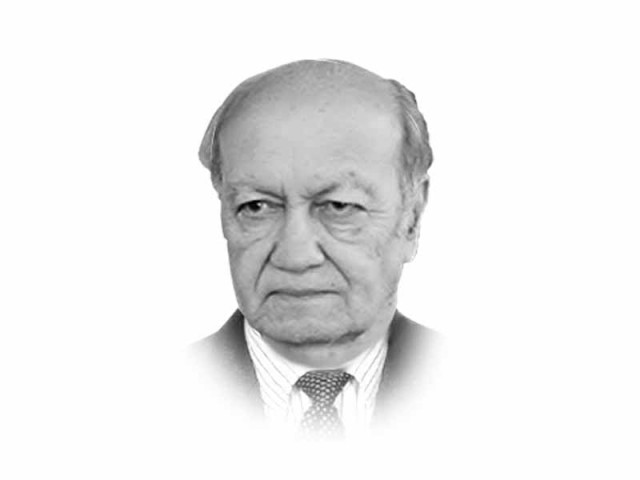Judicial report: an eye-opener
Ideally, the report should trigger a national debate for both reflection and course correction at several levels

The writer is a retired lieutenant general of the Pakistan Army and a former federal secretary. He has also served as chairman of the Pakistan Ordnance Factories Board
Publication of the Quetta carnage inquiry report, an incident that also deeply scarred the nation is an eye-opener of the government’s failings. It is a bold attempt by Justice Qazi Isa at showing the mirror to the federal and provincial governments of their blatant inadequacies in dealing with terrorist organisations both at the policy and implementation level. The tacit acceptance and dealings of state agencies and relevant ministers with proscribed militant organisations like the Sipah-e-Sahaba and others show lack of ideological clarity and absence of strategic direction.
By coincidence, the sixth monthly Pentagon report to Congress has come out with some serious critical observations that tend to reinforce failings pointed out in the Quetta report. In its detailed comment it maintains that the Afghan-Pakistan border region remains a region infested with major regional and global terrorist and extremist networks. As always in the context of Pakistan its concern focuses on the Haqqani Network, Taliban Shura and Lashkar-e-Taiba.
For the Interior minister to contest the veracity of the Quetta report he will have to advance sufficient justification for pursuing the current government policy. Our security establishment has always maintained that it is not advisable nor in Pakistan’s interest to invite the enmity of all militant groups of the region and especially when we have to deal with our own. Pakistan has also tried to explain that the Haqqani network and Taliban are already in control of large spaces in Afghanistan and blaming Pakistan is merely used by Washington and Kabul to cover their failures. As the Taliban control a significant area in Afghanistan it is not wise for Pakistan to open another front against them. In addition, the strong leaning of the Afghan government toward India also prevents our establishment to cut off ties with these Afghan groups. All the regional countries are locked in a perennial blame game that has seriously harmed their interest.
The downside of these policies on society seems to be missing in the government assessment. And this is what the report has very clearly emphasised.
It would be advisable if the Interior minister would not take the criticism as personal because major external factors and internal political dynamics have influenced our national policies over four decades.The role of his ministry though important is not the only element in Pakistan’s policy formulation or its implementation. Chaudhry Nisar however needs to clarify regarding his meetings with proscribed militant groups and the leniency shown toward Lal Masjid management. More important, he should give a comprehensive overview of the progress made so far on the twenty-one points of the NAP. Neither should Balochistan government get into defending the failings that have been enumerated in detail in the report. An ostrich-like approach will perpetuate and worsen the status quo. Punjab has also been rightly criticised for failing to take action against proscribed radical organisations. Expediency and short-term gains seem to be the overriding consideration of the Punjab government for soft-pedalling in their dealings with these organisations.
The suggestion that ISI and other intelligence agencies should be accessible to people by providing their address, as is the practice with other major countries, should be accepted. It will certainly be helpful for the organisation’s image and a useful conduit for the public to share any information that is in national interest.
A very fundamental observation in the report is Pakistan’s drift from Jinnah’s original vision that has encouraged sectarian attacks on minorities, mostly on Shi’a, Ahmadis, Christians and Hindus. This is a sad reflection on how our society has been held captive by radicals and fundamentalists.
In essence, the government has to succeed in creating a strategic environment that can overcome the major challenges confronting the country. Responsibility for this rests on both the civilian and military leadership to embrace change and discard policies that have outlived their utility. Both the civil and military leadership has to seriously reassess the value of asymmetrical forces and tolerance for Afghan Taliban and Haqqani network. The judicial system will have to be strengthened and civil military balance restored. This will not come easily until the civilian leadership improves governance and wins confidence of the people and the military realises that surrendering political power is in the best interest of the country and the institution. Time is ripe for redefining role of our major institutions to match the realities and challenges of the 21st century. If the security situation improves there will be greater room for economy to grow. But this will happen only when deliberate efforts are made to change direction in policies.
The Quetta carnage report has been submitted to the Supreme Court but it also needs to be examined by the national assembly. Its recommendations are very comprehensive and if implemented will go a long way in bringing peace and stability to Pakistan.
Ideally, this report should trigger a national debate for both reflection and course correction at several levels by all institutions and provinces. It would be an exercise in self-deception if we were to assume that progress on National Action Plan has been satisfactory and benchmarks achieved.
This report shows that despite despondency in some quarters not all is lost in Pakistan. There are people like the author who are prepared to honestly dissect issues, identify national weaknesses and recommend corrective measures. It would be a pity if instead of examining these issues objectively they are treated with prejudice and hostility.
Published in The Express Tribune, December 21st, 2016.
Like Opinion & Editorial on Facebook, follow @ETOpEd on Twitter to receive all updates on all our daily pieces.















COMMENTS
Comments are moderated and generally will be posted if they are on-topic and not abusive.
For more information, please see our Comments FAQ